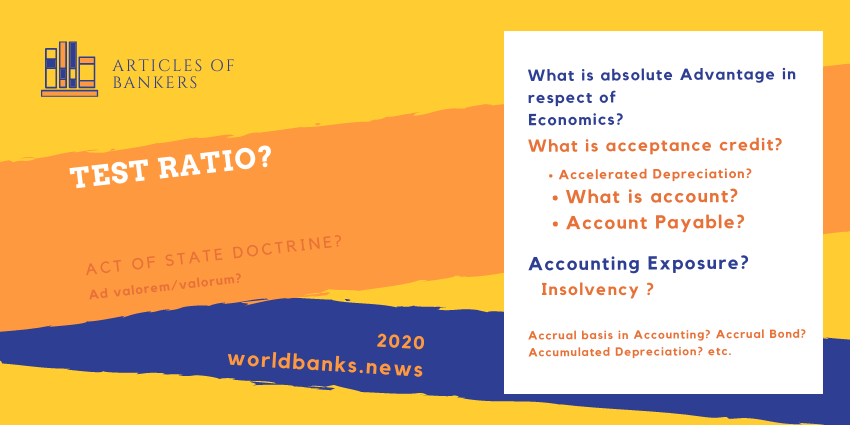What is absolute Advantage in respect of Economics-What is Ad valorem-valorum? etc.
Q.What is absolute Advantage in respect of Economics?
A. A country has an absolute advantage if its output per unit of input of all goods and services produced is higher than that of another county.
Q. What is acceptance credit?
A. Clean credit facility for funding accommodation finance by drawing of a term bill on a bank under an agreed line of credit, whereby the bank on which the bill is drawn will accept it, after which it can be discounted by any bank and so turned into cash. This can also termed as arranged credit.
Q. What is Accelerated Depreciation?
A. Any depreciation method that produces larger deductions for depreciation in the early years of a project’s life. Accelerated cost recovery system (ACRS), which is a depreciation schedule allowed for tax purposes, is one such example.
Q. What is account?
A. Formal record that represents, in words, money or other unit of measurement, certain resources, transaction or other events that result in changes to those resources and claim.
Q. What is Account Payable?
A. Amount owed to a Creditor for delivered the goods or completed the services.
Q. What is Account Receivable?
A. Claim against a debtor for an uncollected amount, generally from a completed transaction of sales or services already rendered.
Q. What is Accounting Exposure?
A. The change in the value of a firm’s foreign currency denominated accounts due to change in exchange rates.
Q. What is Accounting Insolvency?
A. Total liabilities exceed total assets. A firm with a negative net worth is insolvent on the books.
Q. What is Accrual basis in Accounting?
A. Method of accounting that recognizes revenue when earned, rather than when collected. Expenses are recognized when incurred rather that when paid.
Q. What is Accrual Bond?
A. A bond on which interest accrues, but is not paid to the investor during the time of accrual. The amount of accrued interest is added to the remaining principal of the bond and is paid at maturity.
Q. What is Accumulated Depreciation?
A. Total depreciation pertaining to an assets or group of assets from the time the assets were place in services until the date of the financial statement or tax return. This total is contra account to the related asset account.
Q. What is Acid Test Ratio?
A. Ratio of liquid assets(that is current assets less stocks) to current liabilities , giving an indication towards solvency of a company. This ratio arises from the basic desire to measure a business ability to meet its current obligations through the use of its current assets as does the current ration. Acid-Test ratio is also called the “Quick Ratio”.
Q. What is the Act of State Doctrine?
A. This doctrine says that a nation is sovereign within its own border and its domestic action may not be question in courts of another nation.
Q. What is Ad valorem/valorum?
A. Latin phrase meaning “ according to value” showing that a tax is calculated as a percentage of the value of the goods taxed.
Q. What is additional Paid in Capital?
A. Amount paid for stock in excess of its par value or stated value. Also, other amount paid by the stockholders and charged to equity account other than capital stock.
Q. What is Adjustable Peg?
A. Flexible system of fixing exchange rates where rate is allowed to vary within certain defined limits.
Q. What is Affiliated company?
A. Company or other organization related through common ownership, common control of management or owners or through some other control mechanism.
Q. What is Agency Bank?
A. A form of organization/company commonly uses by foreign Banks to enter the U.S market. An agency Bank cannot accept deposits or extends loans in its own name; it can act as agent for the parent or correspondent bank.
Q. What is “Cloth Cap Banking”?
A. Operation of banking account of “blue collar” i.e account of daily laborers, manual workers such factory employees of garments industry , jute mills or any other industry having manual workers.
Q. What is Agio?
A. Difference in value between one currency to another or one kind of money for another or one metallic money and its paper.
Q. What is Arbitrage?
A. Activities of dealers in foreign exchange transaction involving the simultaneous purchase in one market and sale at a different market with a profitable price or yield without risks..
Q. What is Arbitrage Pricing Theory?
A. An alternative model to the capital assets pricing model developed by Stephen Ross which based purely on arbitrage arguments.
Q. What is Arm’s Length Transaction?
A. Business Transaction among the parties, each of whom are very closely related. The transaction between following parties would not be considered arm’s length- a husband and wife, a father and son, an uncle and nephew, a corporation with one of its subsidiaries.
Q. What is Asset-Backed Security?
A. A security that is collateralized by loans, leases, receivables, or installment contracts on personal property, not real estate.
Q. What is appropriation?
A. Money set aside for a specific purpose.
Q. Asset for Asset SWAP?
A. Creditor exchange the debt of one defaulting borrower for debt of another defaulting borrower.
Q. What is Asset-Based Financing ?
A. Method of financing in which lenders and equity investors look principally to the cash flow from a particular assets or set of assets for a return on, and the returns of, their financing.
Q. What is Attachment Order?
A. Order from a court to hold a debtor’s property to prevent it being sold or disposed off until debts are paid. Personal belongings and household goods like useable ornaments/gold , utensils, food , furniture and crokeries in use cannot be attaches as per attachment act
Q. What is Average Rate of Return(ARR)
A. The ratio of the average cash inflow to the amount invested
Q. What is Back-to-Back loan?
A. A loan in which two companies in separate countries borrow each other’s currency for a specific time period and repay the other’s currency at an agreed amount upon maturity.
Q. What is Basic Balance?
A. In a balance of payment, the basic balance is the net balance of the combination of the current account and the capital account.
Q. What is Beggar-Thy-Neighbor?
A. An international trade policy of competitive devaluations and increase protective barriers where one country seeks to gain at the expense of its trading partners.
What is absolute Advantage in respect of Economics?
- A country has an absolute advantage if its output per unit of input of all goods and services produced is higher than that of another county.
What is Accounting Exposure?
A. The change in the value of a firm’s foreign currency denominated accounts due to change in exchange rates.
What is Ad valorem/valorum?
A. Latin phrase meaning “ according to value” showing that a tax is calculated as a percentage of the value of the goods taxed.




















